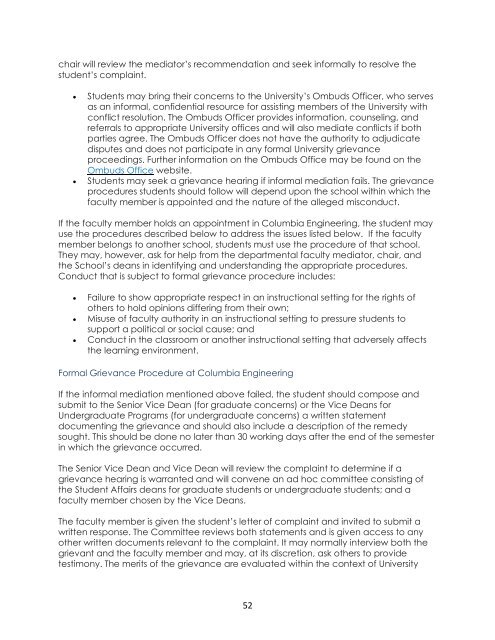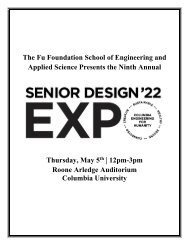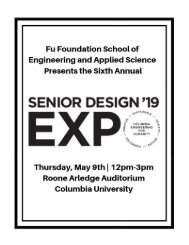2020-2021 SEAS Student Handbook
Create successful ePaper yourself
Turn your PDF publications into a flip-book with our unique Google optimized e-Paper software.
chair will review the mediator’s recommendation and seek informally to resolve the<br />
student’s complaint.<br />
• <strong>Student</strong>s may bring their concerns to the University’s Ombuds Officer, who serves<br />
as an informal, confidential resource for assisting members of the University with<br />
conflict resolution. The Ombuds Officer provides information, counseling, and<br />
referrals to appropriate University offices and will also mediate conflicts if both<br />
parties agree. The Ombuds Officer does not have the authority to adjudicate<br />
disputes and does not participate in any formal University grievance<br />
proceedings. Further information on the Ombuds Office may be found on the<br />
Ombuds Office website.<br />
• <strong>Student</strong>s may seek a grievance hearing if informal mediation fails. The grievance<br />
procedures students should follow will depend upon the school within which the<br />
faculty member is appointed and the nature of the alleged misconduct.<br />
If the faculty member holds an appointment in Columbia Engineering, the student may<br />
use the procedures described below to address the issues listed below. If the faculty<br />
member belongs to another school, students must use the procedure of that school.<br />
They may, however, ask for help from the departmental faculty mediator, chair, and<br />
the School’s deans in identifying and understanding the appropriate procedures.<br />
Conduct that is subject to formal grievance procedure includes:<br />
• Failure to show appropriate respect in an instructional setting for the rights of<br />
others to hold opinions differing from their own;<br />
• Misuse of faculty authority in an instructional setting to pressure students to<br />
support a political or social cause; and<br />
• Conduct in the classroom or another instructional setting that adversely affects<br />
the learning environment.<br />
Formal Grievance Procedure at Columbia Engineering<br />
If the informal mediation mentioned above failed, the student should compose and<br />
submit to the Senior Vice Dean (for graduate concerns) or the Vice Deans for<br />
Undergraduate Programs (for undergraduate concerns) a written statement<br />
documenting the grievance and should also include a description of the remedy<br />
sought. This should be done no later than 30 working days after the end of the semester<br />
in which the grievance occurred.<br />
The Senior Vice Dean and Vice Dean will review the complaint to determine if a<br />
grievance hearing is warranted and will convene an ad hoc committee consisting of<br />
the <strong>Student</strong> Affairs deans for graduate students or undergraduate students; and a<br />
faculty member chosen by the Vice Deans.<br />
The faculty member is given the student’s letter of complaint and invited to submit a<br />
written response. The Committee reviews both statements and is given access to any<br />
other written documents relevant to the complaint. It may normally interview both the<br />
grievant and the faculty member and may, at its discretion, ask others to provide<br />
testimony. The merits of the grievance are evaluated within the context of University<br />
52








